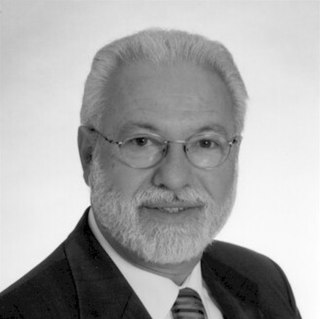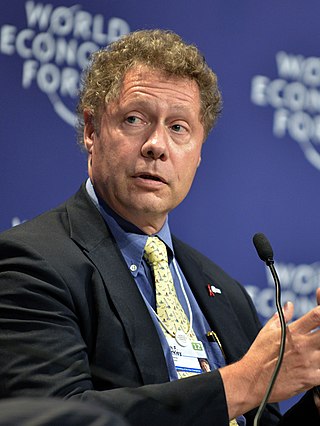An advance market commitment (AMC) is a promise to buy or subsidise a product if it is successfully developed. AMCs are typically offered by governments or private foundations to encourage the development of vaccines or treatments. In exchange,pharmaceutical companies commit to providing doses at a fixed price. This funding mechanism is used when the cost of research and development is too high to be worthwhile for the private sector without a guarantee of a certain quantity of purchases.

Pneumococcal conjugate vaccine is a pneumococcal vaccine made with the conjugate vaccine method and used to protect infants,young children,and adults against disease caused by the bacterium Streptococcus pneumoniae (pneumococcus). It contains purified capsular polysaccharide of pneumococcal serotypes conjugated to a carrier protein to improve antibody response compared to the pneumococcal polysaccharide vaccine. The World Health Organization (WHO) recommends the use of the conjugate vaccine in routine immunizations given to children.

Pneumococcal vaccines are vaccines against the bacterium Streptococcus pneumoniae. Their use can prevent some cases of pneumonia,meningitis,and sepsis. There are two types of pneumococcal vaccines:conjugate vaccines and polysaccharide vaccines. They are given by injection either into a muscle or just under the skin.
Robert Austrian was an American infectious diseases physician and,along with Maxwell Finland,one of the two most important researchers into the biology of Streptococcus pneumoniae in the 20th century.

Ciro Carlos Araujo de Quadros was a Brazilian leader in the field of Public Health,in particular,the area of vaccines and preventable diseases. He was born in Rio Pardo,Brazil.

Seth Franklin Berkley is an American medical epidemiologist and a global advocate of the power of vaccines. He is the founder and former president and CEO of the International AIDS Vaccine Initiative (IAVI) and former CEO of Gavi,the Vaccine Alliance. He is currently a senior advisor to the Pandemic Center at Brown University School of Public Health.
Maria Deloria Knoll is an expert in the fields of epidemiology,disease surveillance,vaccine trial conduct,and biostatistics. She currently serves as associate director of Science at the International Vaccine Access Center (IVAC),an organization dedicated to accelerating global access to life-saving vaccines,at the Johns Hopkins Bloomberg School of Public Health in Baltimore,Maryland.
Lois Privor-Dumm is an American public policy expert in the field of vaccine introduction.
World Pneumonia Day provides an annual forum for the world in the fight against pneumonia. More than 100 organizations representing the interests of children joined forces as the Global Coalition against Child Pneumonia to hold the first World Pneumonia Day on 12 November 2009. Save The Children artist ambassadors Gwyneth Paltrow and Hugh Laurie,Charles MacCormack of Save The Children,Orin Levine of PneumoADIP,Lance Laifer of Hedge Funds vs. Malaria &Pneumonia,the Global Health Council,the GAVI Alliance,and the Sabin Vaccine Institute joined together in a call to action asking people to participate in World Pneumonia Day on 2 November.

Katherine "Kate" L. O'Brien is a Canadian American pediatric infectious disease physician,epidemiologist,and vaccinologist who specializes in the areas of pneumococcal epidemiology,pneumococcal vaccine trials and impact studies,and surveillance for pneumococcal disease. She is also known as an expert in infectious diseases in American Indian populations. O’Brien is currently the Director of the World Health Organization's Department of Immunization,Vaccines and Biologicals.
The International Vaccine Institute (IVI) is a non-profit,autonomous international organization established with the mandate of making vaccines available to all. Collaborating closely with the global scientific community,public health entities,governments,and industry stakeholders,IVI focuses on vaccine research and deployment. This includes conducting new vaccine designs in laboratories,advancing vaccine development and assessment in real-world settings,and facilitating the sustainable integration of vaccines in regions where they are most urgently required.

The Pneumococcal Awareness Council of Experts (PACE) is a project of the Sabin Vaccine Institute and is composed of global experts in infectious diseases and vaccines. Established in December 2006,The Council seeks to raise awareness among policymakers and aims to secure global commitments to prevent pneumococcal disease,a leading infectious killer of children and adults worldwide. The Council works in collaboration and partnership with countries,NGOs,academia and industry.

George Wills Comstock was a public health physician,epidemiologist,and educator. He was known for significant contributions to public health,specifically in the fields of micronutrient deficiencies,tuberculosis,and cardiovascular disease. He served as the editor-in-chief for the American Journal of Epidemiology.
Daniel R. Feikin is an American epidemiologist. He specializes in the epidemiology of infectious diseases in developing countries. He currently serves as Director of Epidemiology at the International Vaccine Access Center (IVAC),an organization dedicated to increasing global access to vaccines,at the Johns Hopkins Bloomberg School of Public Health in Baltimore,Maryland. He earlier worked at the National Centers for Infectious Diseases,Centers for Disease Control and Prevention,Atlanta,Georgia. While working for the CDC he lived for a time in Kisumu,Kenya,from which he and his family had to be evacuated in 2008 due to local violence.

GAVI,officially Gavi,the Vaccine Alliance is a public–private global health partnership with the goal of increasing access to immunization in poor countries. In 2016,Gavi channeled more than half of total donor assistance for health,and most donor assistance for immunization,by monetary measure.

George Rainer Siber is a medical researcher and vaccine expert with 49 years of experience in developing numerous vaccines,therapeutic antibodies,and diagnostic agents for infectious diseases.
Claire Veronica Broome is an American epidemiologist,specializing in public health surveillance and vaccine evaluation,who has contributed to the development and effective utilization of key vaccines against pathogens causing pneumonia and meningitis. She joined the Centers for Disease Control and served with the CDC for 28 years,eventually holding the positions of deputy director,acting CDC director (1998),and senior advisor for integrated heath information systems. In 1995 she was promoted to assistant surgeon general in the US Public Health Service.

Samir Kumar Saha is an eminent Bangladeshi microbiologist and public health expert. He is the professor,senior consultant and head of the department of Diagnostic Division of Microbiology at the Dhaka Shishu Hospital for children and also the executive director of The Child Health Research Foundation (CHRF) at the Bangladesh Institute of Child Health.
Mathuram Santosham is an Indian American physician who is Professor and Chair at the Johns Hopkins Bloomberg School of Public Health. Santosham is best known for his work on oral rehydration therapy and childhood vaccines,with a focus on supporting people from indigenous communities.

Shabir Ahmed Madhi,is a South African physician who is professor of vaccinology and director of the South African Medical Research Council Respiratory and Meningeal Pathogens Research Unit at the University of the Witwatersrand,and National Research Foundation/Department of Science and Technology Research Chair in Vaccine Preventable Diseases. In January 2021,he was appointed Dean of the Faculty of Health Sciences at the University of the Witwatersrand.










